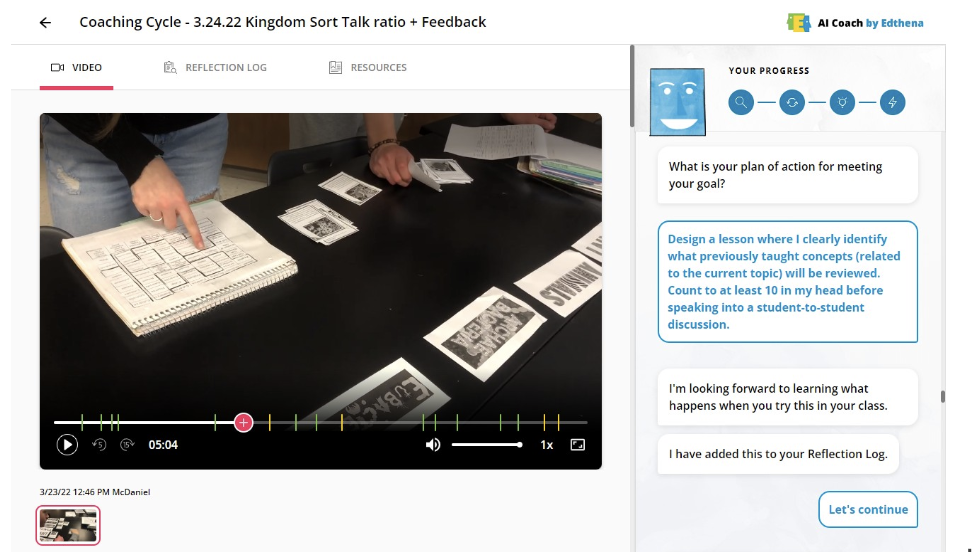(Above: Screenshot of the AI coaching program McDaniel piloted for her district.)

I’m a perfectionist. I am always looking to improve my skills and be the best teacher possible for my 9th-grade science students. However, when it comes to trying out innovative technology — whether it is the latest iPhone or new edtech to support my teaching — I admittedly get a bit uncomfortable.
This is something I’m continually working on as I approach my 30th year in the classroom. Just as I always want to push my students with their learning, I always push myself to grow too. So, when an opportunity arose in Keller Independent School District to test out artificial intelligence instructional coaching, I was on board.
Supporting professional learning with AI
My district was one of the first in the country to pilot AI Coach by Edthena. While the thought of using artificial intelligence for teacher coaching seemed almost like sci-fi, the premise of the platform is fairly straightforward: Teachers have a conversation with a virtual coach and work through guided coaching cycles aligned to growth areas, such as pacing or checking for student understanding. During the process, teachers upload and analyze classroom videos of their teaching as they work with the virtual coach to develop goals and strategies for improvement.
With video coaching already a part of my repertoire, I was ready — although still a bit skeptical — to try AI coaching as an avenue for professional development. It was a voluntary initiative, so there was zero pressure.
This way of coaching taught me several things.
AI coaching can build teachers’ confidence
I was surprised by how intuitive it was. It was clear to me what to do and how to navigate through each step of the coaching process. There were tips for how to upload my video and frequent check-ins from the virtual coach, just like a real, in-person coach would provide.
This all helped me feel confident as I went through the coaching cycle. And the process of interacting via a chat-style conversation with the virtual coach allowed me to really focus on analyzing my videos and reaping the full benefits of the technology.
AI coaching creates reflective practitioners
During the coaching cycle, I wanted to work on increasing student feedback and engagement, so I set “facilitating group discussions” as my focus area. Significantly, I had the agency to decide what was important to me for the coaching cycle.
I captured a video of a small-group activity centered on the characteristics of the kingdoms of life. Students walk away with a better understanding of content when they talk and engage with one another, so I wanted my students to really collaborate during this activity.
During the video analysis, the virtual coach asked probing questions to guide my self-reflection. I liked how the process centered on me discovering what was happening inside my classroom instead of hearing from someone else about what they saw happening inside my classroom.
Analyzing my video for evidence related to my goal helped me see a pattern of how I too quickly jumped in on students’ conversations if they were using inaccurate science terminology. My students’ body language changed when I did this, and they stopped talking as much afterward.
Without the video and guided self-reflection process, I would not have realized this was happening. I was able to set a near-term goal to implement a change: I paused longer to listen, letting students’ conversations play out before joining the conversation to discuss correct terminology with them.
AI coaching is a personalized PD experience
Throughout the coaching cycle, one of the biggest benefits was the personalization AI coaching provided. The virtual coach helped me develop my specific goal and reflect on that goal using targeted prompts by providing tips, suggestions and questions related to that goal.
This taught me how to better coach myself — what to look for and what questions to consider. Since my principal and in-person coach cannot be in my classroom every day providing feedback, this acts as a great supplement to their ongoing support. And the process prepares me to be a better collaborator with my colleagues because I have a sharpened understanding of what’s happening in my classroom based on the evidence I found.
As helpful as this was to me as a veteran teacher, I can see the use of AI coaching being especially beneficial for new teachers looking to receive extra personalized support. Accessing the virtual coach on-demand could help them more quickly develop their craft and become effective reflective practitioners.
Interacting with a virtual coach can also help all teachers more quickly gain confidence with the in-person coaching process. AI coaching is something I can envision using with my mentees.
AI coaching offers objective view
As educators, we are constantly working to improve our practice, needing more of the types of supports that help us implement high-impact changes promptly within our classrooms.
Yes, in-person coaching is terrific because it is often delivered by colleagues who have shared similar teaching experiences and who likely know the history of one’s school and classroom. They can share best practices, affirm good teaching or support change in areas outside of a teacher’s identified goal.
That said, AI coaching can truly help teachers coach themselves while they wait until their next conversation with an in-person coach. A virtual coaching tool can give teachers an objective look at their teaching and is available anytime they are ready. It is flexible and self-directed, so teachers never have to worry about scheduling conflicts.
So do I think AI coaching for teachers can or should replace all in-person conversations about teaching? No. Do I think AI-powered virtual coaching for teachers can enhance our in-person collaborations while helping all teachers experience timelier coaching more often? Absolutely!
Donna McDaniel is a ninth-grade science teacher in Keller Independent School District in Texas. She has taught for 29 years, been an INSPIRE mentor teacher for the past nine years and participated in her school’s pilot of the AI Coach by Edthena platform.
________________________________
If you liked this article, sign up for SmartBrief’s free email newsletter on EdTech. It’s among SmartBrief’s more than 250 industry-focused newsletters.
More from SmartBrief Education:
- 5 ways new school-home communication meets family, staff needs
- 5 virtual-classroom tools to foster authentic connections
- Changing the classroom experience with instructional audio
- Powerful social media solutions for students
- How comics curriculum boosts SEL
- 8 ways to make vocabulary instruction more effective
